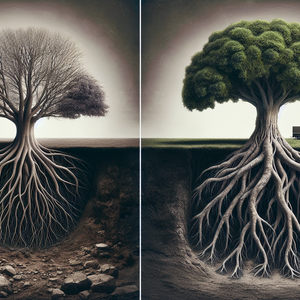Healing Through Heritage: Bridging Cultural Roots and Mental Wellness in Black Communities

Black communities have long navigated the challenges of systemic oppression, racism, and inequality, relying on cultural traditions as sources of strength, solidarity, and resilience. These traditions, deeply embedded in the fabric of Black heritage, have served as a means of coping and survival. Storytelling, for instance, has historically been a cornerstone of African and African American culture, preserving history, values, and lessons across generations. Beyond its cultural significance, storytelling is now being recognized for its therapeutic potential in fostering mental wellness. In group therapy settings aimed at Black individuals, oral storytelling has been effectively used to help participants process trauma in a culturally affirming space. Sharing personal narratives allows individuals to feel seen, validated, and understood, breaking through the silence and isolation that often accompany mental health struggles. These practices remind participants that healing is not an individual journey but a collective one, rooted in the ancestral wisdom that has sustained Black communities through centuries of adversity. By reframing mental wellness as a shared and culturally grounded experience, these initiatives create a bridge between heritage and healing.
Art as a Path to Wellness
Art, in its many forms, has always been a profound tool for self-expression, emotional release, and healing. In Black communities, art holds particular significance, serving as a medium to express joy, pain, resistance, and resilience. From the soulful sounds of gospel and jazz to the vibrant canvases of Black visual artists, creative practices have long been used to navigate struggles and celebrate triumphs. Today, mental health programs are harnessing this rich artistic legacy to foster emotional well-being. Organizations like the Black Emotional and Mental Health Collective (BEAM) are leading the charge in integrating art therapy into their mental health initiatives. Through workshops that encourage participants to explore their emotions via painting, poetry, music, and dance, these programs offer therapeutic benefits in a way that feels culturally relevant and accessible. Art becomes not only a vehicle for self-discovery but also a connection to the rich artistic heritage of Black communities, making mental health care more relatable and impactful. A particularly powerful example is the use of African drumming as a therapeutic tool. Drumming circles have been introduced in some mental health programs to help participants connect with their cultural roots while experiencing the grounding and meditative effects of rhythm. The act of drumming fosters a sense of unity, promotes mindfulness, and instills cultural pride, demonstrating how art can intersect with heritage to promote healing.
Reconnecting with Ancestral Traditions
Ancestral traditions provide a profound sense of continuity and strength, reminding individuals of the resilience and wisdom passed down through generations. For Black communities, reconnecting with these traditions can serve as a powerful tool for mental wellness. Practices such as libations, meditation rooted in African spirituality, and rituals honoring ancestors are increasingly being integrated into mental health initiatives to help individuals find healing through their heritage. For example, grief counseling programs have begun incorporating African-inspired ceremonies to help participants process loss in culturally meaningful ways. These ceremonies often include music, prayer, and symbolic acts such as releasing burdens, creating a space where individuals can mourn while feeling supported by their heritage. By honoring their ancestors, participants find a sense of connection and strength that can transform their grief into resilience. Meditation practices inspired by African spirituality also play a significant role in fostering emotional regulation and mindfulness. Rooted in traditions that emphasize grounding oneself in the present while honoring ancestral wisdom, these practices blend mental wellness with cultural reverence. They offer participants a sense of peace and empowerment, illustrating the transformative potential of reconnecting with one’s roots.
Breaking Mental Health Stigmas
One of the greatest challenges to addressing mental health in Black communities is the pervasive stigma surrounding it. Many individuals view seeking help as a sign of weakness or a betrayal of cultural norms that prioritize resilience and self-reliance. This stigma often discourages individuals from seeking the support they need, perpetuating cycles of silence and suffering. However, culturally rooted mental health initiatives are beginning to change the narrative. Programs like the Akoma Project, which provides trauma-informed care for Black youth, place a strong emphasis on cultural pride and identity. By teaching young people about their history and traditions, these programs help them see mental health care as a continuation of the strength and resilience embodied by their ancestors. Similarly, initiatives like NAMI Sharing Hope introduce mental health discussions through community conversations, making the topic more approachable and relatable. These efforts demonstrate that healing is not only acceptable but also deeply aligned with Black heritage. By reframing mental wellness as an extension of cultural pride and resilience, these initiatives are breaking down barriers and encouraging individuals to seek the support they need.
Healing through heritage is not just a strategy for addressing mental health challenges—it is a reclamation of identity and a celebration of cultural resilience. By integrating practices such as storytelling, art, and ancestral traditions into mental health initiatives, Black communities are creating spaces where emotional well-being and cultural pride intersect. These efforts not only challenge the stigma surrounding mental health but also provide a pathway to healing that is deeply rooted in the strength and wisdom of Black heritage. As programs like BEAM, the Akoma Project, and NAMI Sharing Hope continue to expand, they highlight the importance of culturally sensitive approaches to mental wellness. Through their work, they remind us that mental health care is not a one-size-fits-all solution—it must reflect the unique experiences, histories, and traditions of the communities it serves. For Black communities, healing through heritage offers not only a means of addressing mental health struggles but also a profound connection to the past and a renewed hope for the future. By embracing these culturally affirming approaches, we can create a more inclusive and compassionate framework for mental wellness—one that honors the enduring strength and wisdom of Black heritage while paving the way for a healthier, more empowered future.
Culturally Responsive Mental Health Counselor
Responsibilities
Provide therapy services tailored to the cultural backgrounds of Black individuals and communities, using approaches such as oral storytelling, art therapy, or ancestral traditions.
Facilitate group therapy sessions, creating safe spaces for participants to share personal narratives and process trauma collectively.
Collaborate with organizations like BEAM or NAMI to develop community-based mental health programs.
Required Skills
Master’s degree in counseling, psychology, or social work with a focus on cultural competency.
Training or experience in culturally affirming therapeutic practices, such as African-inspired mindfulness techniques or trauma-informed care.
Strong understanding of systemic issues impacting Black communities, including racism, generational trauma, and stigma around mental health.
Art Therapist Specializing in Cultural Healing
Responsibilities
Develop and lead art therapy workshops that incorporate cultural practices, such as African drumming, painting, or poetry, to promote emotional expression and healing.
Support clients in exploring their identities and heritage through creative mediums, fostering a sense of pride and resilience.
Partner with mental health organizations or community groups to deliver accessible, culturally relevant art-based therapy.
Required Skills
Certification as a Registered Art Therapist (ATR) or Licensed Creative Arts Therapist (LCAT).
Expertise in integrating cultural and ancestral themes into art therapy practices.
Familiarity with historical and contemporary Black art movements to connect clients with cultural legacies.
Community Mental Health Program Coordinator
Responsibilities
Design and implement culturally sensitive mental health programs, such as grief counseling that incorporates African-inspired ceremonies or workshops on Black identity and resilience.
Train staff and volunteers on cultural humility and trauma-informed care specific to Black communities.
Advocate for mental health equity by partnering with local organizations like the Akoma Project or BEAM.
Required Skills
Background in public health, social work, or psychology with experience in program design and community engagement.
Strong knowledge of the unique mental health challenges faced by Black communities and the role of cultural heritage in healing.
Excellent organizational and leadership skills to manage resources and coordinate outreach efforts.
Cultural Competency Trainer for Mental Health Professionals
Responsibilities
Develop and deliver training sessions for therapists and counselors on cultural competency, focusing on the specific needs of Black clients.
Create educational materials that incorporate themes like systemic oppression, cultural pride, and the therapeutic value of ancestral traditions.
Conduct workshops on how to integrate storytelling, art, and spirituality into therapy practices.
Required Skills
Experience in training or curriculum development within the mental health field.
Deep understanding of Black heritage, systemic challenges, and mental health stigmas.
Strong communication and facilitation skills to engage diverse audiences and promote cultural humility.
Researcher in Culturally Affirming Mental Health Practices
Responsibilities
Conduct research on the effectiveness of culturally rooted mental health interventions, such as African drumming for mindfulness or storytelling for trauma recovery.
Publish findings in academic journals and present at conferences to advocate for culturally sensitive approaches to mental health care.
Collaborate with community organizations to collect data and assess program outcomes.
Required Skills
Advanced degree in psychology, social work, or a related field with a focus on cultural psychology or community health.
Strong qualitative and quantitative research skills, including experience with community-based participatory research (CBPR).
Passion for advancing mental health equity and creating evidence-based frameworks for culturally affirming care.


